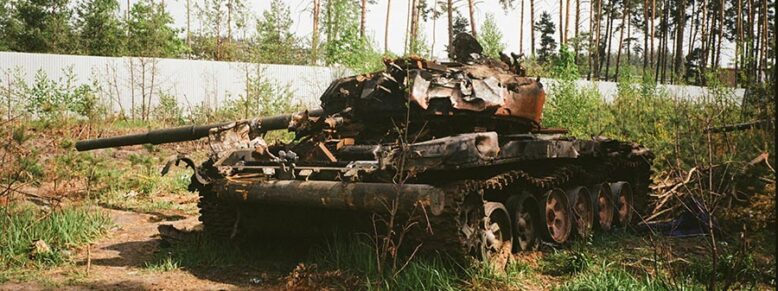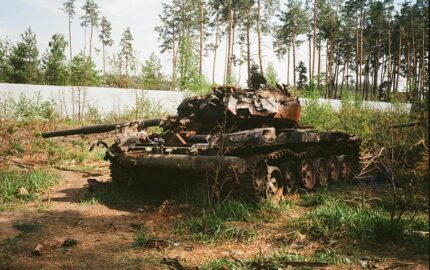Laudato si made just one reference to the impact of war on the environment, noting:
War always does grave harm to the environment and to the cultural riches of peoples, risks which are magnified when one considers nuclear arms and biological weapons.
However, in his message for the 2025 Season of Creation, Pope Leo did address the connection. He wrote: “Extreme natural phenomena caused by climate changes provoked by human activity are growing in intensity and frequency (cf. Laudato Deum, 5), to say nothing of the medium and long-term effects of the human and ecological devastation being wrought by armed conflicts.”
This link between ecology and armed conflict is extremely important.
Most obviously, there is the direct impact of military conflict on the environment – military operations, weapons testing, and so on directly destroy the environment and create significant carbon emissions. But there are broader implications too. Indeed, the indirect costs or war and conflict are likely to be substantially greater than the direct environmental costs of military action. The indirect effects come through a number of channels.
Firstly, in many conflicts, the capacity of the state is undermined, or even destroyed. Thereby its ability to police, regulate and manage property rights in general, including in relation to environmental resources, is impaired. Conflicts that destroy state capacity include, civil wars, violence waged by drugs gangs against the legitimate government, and so on. In fact, these form about two-thirds of all conflicts. Solid institutions of governance are needed to protect environmental resources from destruction by, for example, criminal gangs and poachers. When conflict reduces or destroys state capacity, environmental resources are simply plundered; poaching increases; illegal logging increases; and so on. As the World Worldlife Fund states: “Illegal logging is one of the most serious threats [to forests]. It’s been responsible for driving some wildlife towards extinction – and it deprives forest communities of vital resources.”
Secondly, all forms of war and civil conflict can create dire poverty. Dire poverty, in turn, leads to short-term actions that prioritise survival over everything else. When the choice is between eating bushmeat or starving, there is no real choice. Normal sources of food supply are often cut off in war and, as a result, environmental resources will be plundered as substitutes.
Civil conflict is also associated with the movement of huge numbers of people, often into areas of high levels of bio-diversity which is then undermined or totally destroyed. Also, instead of living off sustainable forms of agriculture, people on the move will often simply plunder what is available out of necessity.
Although the Church has qualified its support for the institution of private property when it comes to the natural environment, an effective regime for the protection of property rights is vital for the promotion of good environmental outcomes – even if the state might have to regulate the use of environmental resources. Most environmental resources, such as forests and fisheries are cultivated and used by communities to provide for their livelihoods, generally in a sustainable way. If the users of environmental resources cannot be sure that they will be able to nurture those resources and have the right to their use over a long period of time because of the uncertainties created by conflict, they will be exploited for immediate gain instead.
A few concrete examples demonstrate these points.
A study in the journal Nature found that, in peacetime, the number of large herbivores stays largely stable in protected areas in Africa. But just one year of conflict in 20 years causes wildlife to decline. A 15-year civil war in Mozambique, for instance, caused one national park (the size of Essex) to lose 90 per cent of its wildlife – 90 per cent.
Conflict in Africa has been responsible for the near extinction of the northern white rhinoceros through poaching and destruction of its habitat.
In Angola, the civil war led to a fall of at least 80 per cent in the populations of 20 out of 26 mammal species. In the civil wars in Angola and Sudan, elephant numbers fell by 95 per cent over a period of about 20 years.
During the Rwandan civil war almost three-quarters of a million people lived in camps on the edge of Virunga national park. According to the Worldwatch Institute, around 1,000 tonnes of wood was removed from the park every day for two years. By the time the conflict ended 105 square kilometres of forest had been damaged and 35 square kilometres stripped bare.
In Afghanistan, successive civil wars have destroyed wildlife and habitats caused largely by illegal logging by warlords and wood harvesting by refugees. More than one-third of Afghanistan’s forests have vanished with the number of migratory birds passing through Afghanistan falling by 85 per cent.
Now conflicts are on the rise again, these are important messages. The video below tells an interesting story of the destruction of the environment by conflict in Mozambique and its recovery in peacetime.
—
Photo by Mykhailo Volkov
—







